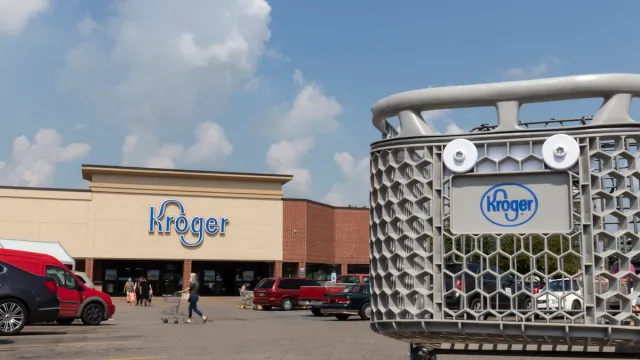Kroger Promises “Even Lower Prices” for Shoppers—Here’s When

Concerns regarding Kroger’s extensive merger with Albertsons—which is expected to be completed during the first half of Kroger’s 2024 fiscal year, according to a CNBC report—continue to leave shoppers divided. However, Kroger wants customers to know that good things are headed their way. In fact, one of the biggest perks that will come from the merger is “even lower prices,” Kroger’s Chairman and CEO Rodney McMullen recently announced.
RELATED: Walmart Shoppers Say Never Buy Great Value “Ever”—Here’s Why.
“We believe the way to be America’s best grocer is to provide great value by consistently lowering prices and offering more choices. When we do this, more customers shop with us and buy more groceries, which allows us to reinvest in even lower prices, a better shopping experience, and higher wages,” McMullen said in a Feb. 13 press release.
McMullen added that he is confident “more fresh, affordable choices” will be a win for both the company and customers as the decision is “consistent with [Kroger’s] approach to previous mergers.”
“This strategy is not new to Kroger. The retailer has invested to lower prices consistently since 2003, resulting in $5 billion in customer savings and providing more affordable products to families across America,” the press release noted.
Be that as it may, many store associates and customers are feeling trepidatious about the pending merger with Albertsons. Fellow industry experts like Michael Needler Jr., president and CEO of Fresh Encounter, an Ohio-based chain of 98 grocery stores, are worried the merger could have the opposite effect—leading to an increase in prices instead.
“When the large power buyers demand full orders, on time and at the lowest cost, it effectively causes the water-bed effect,” Needler said in an interview with The New York Times. “They push down, and the consumer packaged goods companies have no option but to supply them at their demands, leaving rural stores with higher costs and less availability to products.”
There’s also the fear of store closures, which would consequently result in job losses. In Sept. 2023, the two supermarket chains announced they would be offloading more than 400 stores to C&S Wholesale Grocers, LLC., which operates popular grocery chains like Grand Union and Piggly Wiggly.
RELATED: 6 Secrets Kroger Doesn’t Want You to Know.
If the $24.6 billion deal goes through, Kroger would take ownership of the 24 grocery chains that operate under Albertsons. These include stores such as Vons, Safeway, Jewel-Osco, and Acme. The merger would help Kroger and Albertsons better compete with big-box stores like Walmart, Target, and Costco, per The New York Times.
In the spirit of keeping prices affordable and improving “the customer experience,” Kroger announced on Feb. 13 that it will invest $500 million to lower prices and an additional $1.3 billion to improve Albertsons’ stores following the close of the transaction.
“Kroger expects to grow revenues and drive additional investments in pricing and store improvements as well as wages and benefits,” reads the press release.